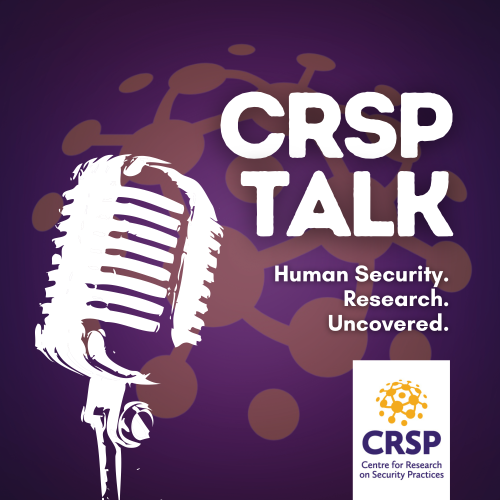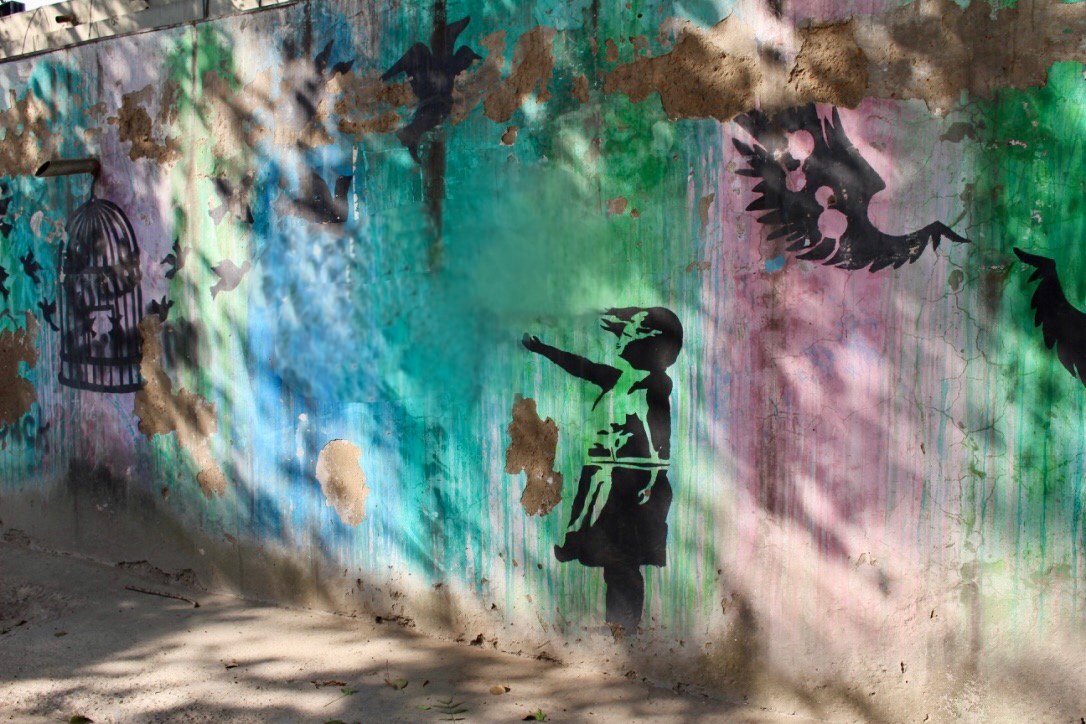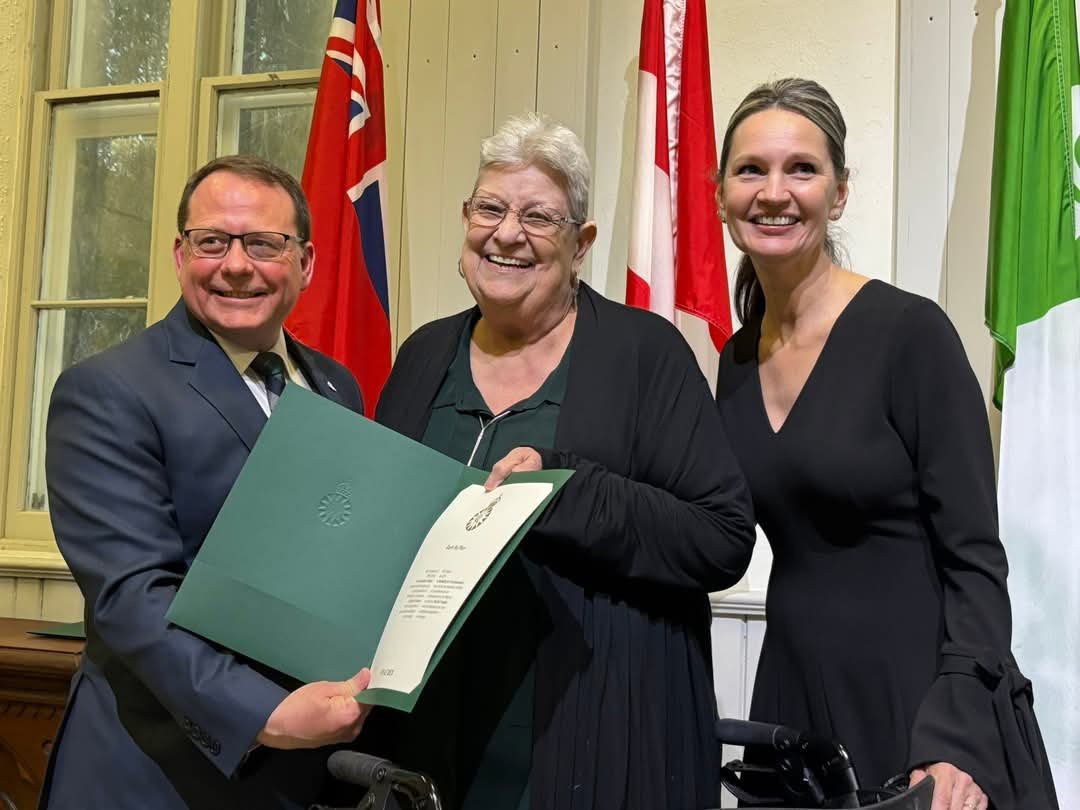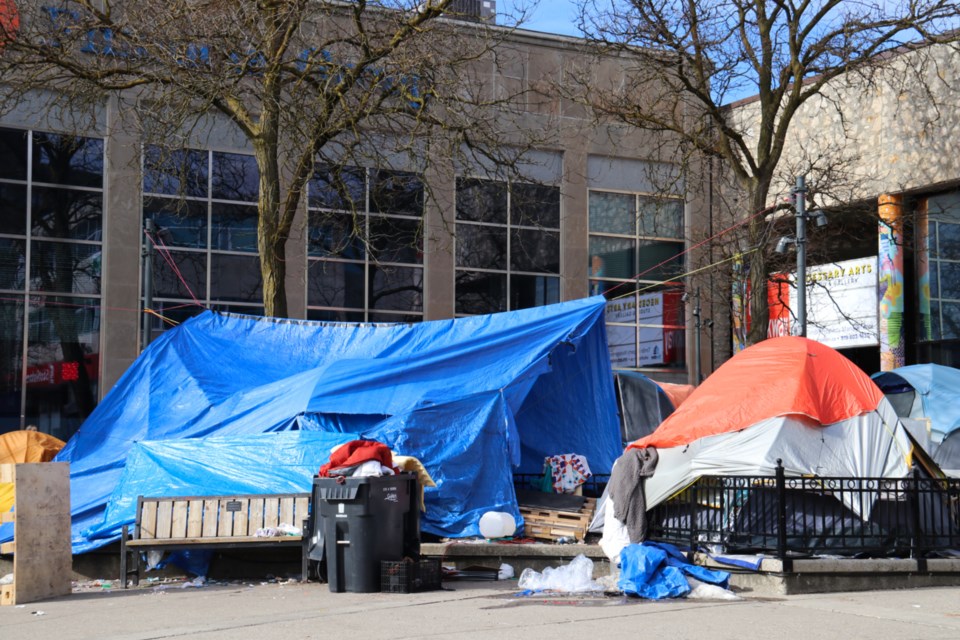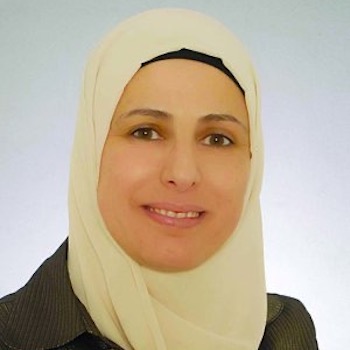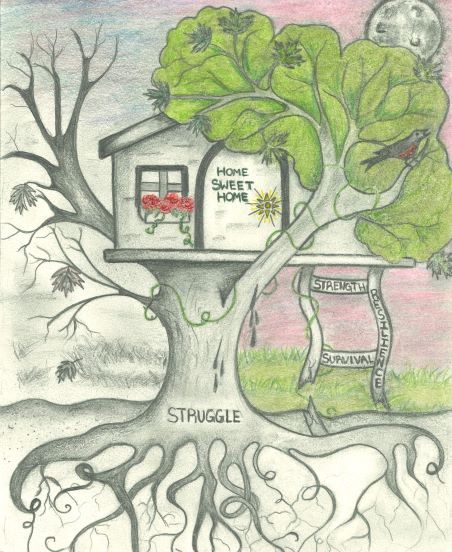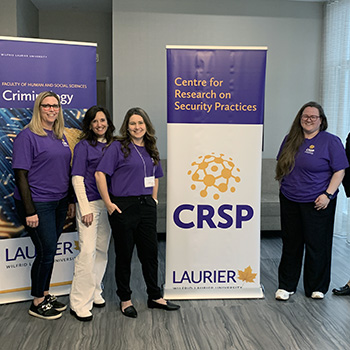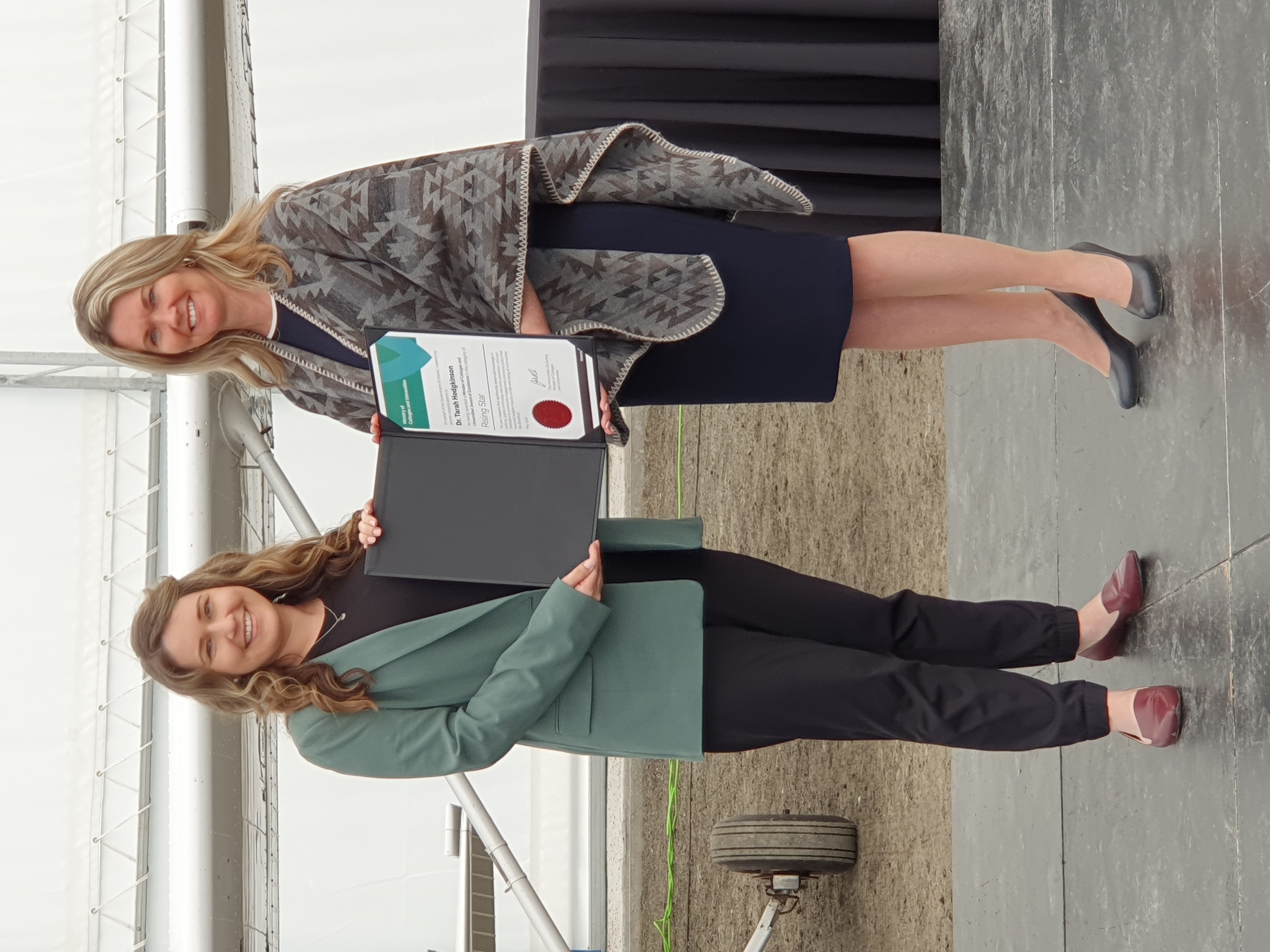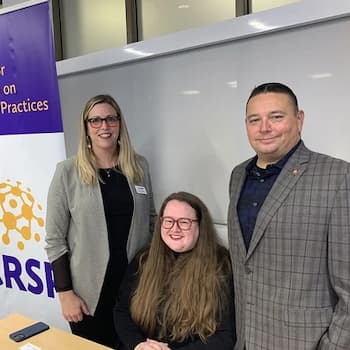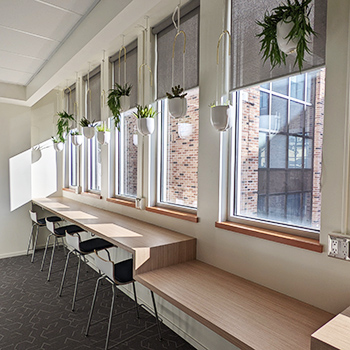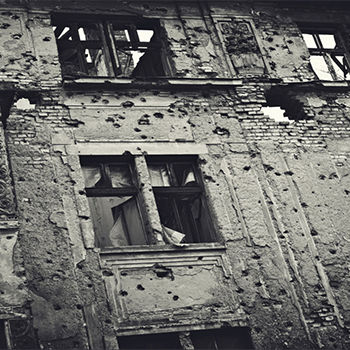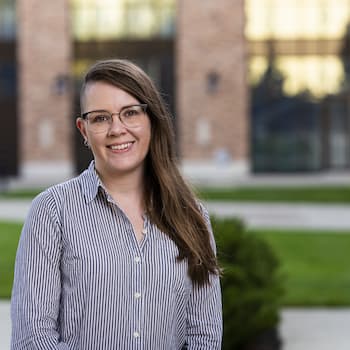In this podcast, researchers discuss the expectations and evidence-based conclusions about body-worn camera efficacy. The podcast speaks to important issues of transparency, the need for policies that demonstrate care for their communities, and the need for organizational reform alongside effective technological integration.
CRSP Talk Podcast
Join us as we talk to researchers, students, practitioners, and policy and social change makers to explore diverse topics related to human security. CRSP Talk features discussions about threats to human security as well as insights into how it is enhanced and sustained. Along the way, we will periodically pause to discuss the research process itself and how researchers journey from generating ideas to sharing findings.

Episode Notes
Let’s unpack the rise of facial recognition technology in Canadian policing—how it works, where it’s being used, and why public consultation matters more than ever. Andrea Slane and Chris O’Connor, researchers from Ontario Tech University, explore their project on the real-world impacts of this technology following the Clearview AI scandal. They get into questions of oversight, bias, public trust, and the urgent need for policy to keep pace with innovation. From the streets of Cobourg, Ontario, to the halls of Parliament, this episode examines how communities are (and aren’t) being invited into conversations about how technology is shaping policing policy in Canada
Read the transcript
Episode Notes
Guests for this episode:
Christopher D. O’Connor is an Associate Professor in the Criminology and Justice program at Ontario Tech University. His primary research areas include policing, youth participation in crime, rapid growth communities, and emerging/disruptive technologies. He has researched public perceptions of a range of issues, including crime, disruptive technologies, and attitudes toward the police. More recently, his research has examined police data quality and collection techniques, auxiliary police, and the use of facial recognition technology by the police.
Andrea Slane is a Professor in the Legal Studies program at Ontario Tech University. Her research focuses on privacy, data protection, and the variety of legal regimes that protect people from both individual and commercial wrongdoing online, over digital devices and via smart technologies. She uses a range of methods, including doctrinal legal analysis, qualitative data collection and analysis, and cultural studies to contribute to determining more just means to regulate the flow of personal and community-level information, whether between individuals, individuals and businesses, businesses and government, business-to-business, or to the public.
Links to Research:
Andrea Slane, “Privacy Protective Roadblocks and Speedbumps Restraining Law Enforcement Use of Facial Recognition Software in Canada” (2021) 69:2 Criminal Law Quarterly 216-236. Available at SSRN: https://ssrn.com/abstract=4275241
Christopher O’Connor, Andrea Slane, Dallas Bouckley (Hill) and Victoria Baker, “Public Perceptions of Facial Recognition Use by Police in Canada” (2025) Policing and Society, 1-15. https://doi.org/10.1080/10439463.2025.2508192
Dallas Hill, Christopher O’Connor, and Andrea Slane, “Police Use of Facial Recognition Technology: The Potential for Engaging the Public through Co-Constructed Policy-Making” (2022) 24:3 International Journal of Police Science and Management, 325-335, https://doi.org/10.1177/14613557221089558.
Bradford, B., et al., 2020. Live facial recognition: trust and legitimacy as predictors of public support for police use of new technology. The British journal of criminology, 60 (6), 1502–1522. https://doi.org/10.1093/bjc/azaa032
Bragias, A., Hine, K., and Fleet, R., 2021. Only in our best interest, right?’ Public perceptions of police use of facial recognition technology. Police practice and research, 22 (6), 1637–1654. https://doi.org/10.1080/15614263.2021.1942873
This episode was funded, in part, by Venture13 Policetech Accelerator
It was funded by the Social Sciences and Humanities Research Council of Canada.
This episode was produced by Avery Moore Kloss from Folktale Studio.

In this episode, CRSP Steering Committee member Nuha Dwaikat-Shaer brings together colleagues Ron Smith and Omar Jabary Salamanca to have a conversation about research in settler colonial contexts, with a focus on Palestine. In this conversation, Nuha, Omar and Ron talk about why terminology can have important implications for the effectiveness of research in places like Palestine. We also dive into both the challenges and opportunities they’ve come across doing field work in settler colonial contexts.
Read the transcript
Episode Notes
Executive Producer for this episode is:
Nuha Dwaikat-Shaer is an assistant professor in the Faculty of Social Work at Wilfrid Laurier University. She is also a Steering Committee member at the Centre for Research on Security Practices. She recently completed her PhD at the School of Social Work at McGill University. Her research focuses on space and housing rights and how that's affected by settler colonial practices. Her broad research agenda focuses on access to social services for racial minorities in settler colonial contexts, rooted in a commitment to human rights and social justice.
Guests for this episode include:
Ron Smith is an Associate Professor of International Relations at Bucknell University in Lewisburg, Pennsylvania. Much of his work is focused on Palestine, The West Bank and Gaza.
Omar Jabary Salamanca is a Research Fellow and Co-Director Of The Observatory Of The Arab and Muslim Worlds at the University of Bristol in Belgium. His research and teaching focus on questions of Political Geography, Political Economy and Political Ecology In Settler Colonial Contexts.
This episode was produced by Avery Moore Kloss from Folktale Studio.
It was funded by the Social Sciences and Humanities Research Council of Canada.

Join us as we unravel the complexities of violent extremism in Canada with our esteemed guests, psychologist Ghayda Hassan and social work expert David Yuzva Clement. In this episode, we discuss the growing threat of far-right hate groups, fueled by social polarization and the powerful influence of social media. Ghayda and David provide valuable insights into how online platforms act as catalysts, enhancing extremist outreach and fostering dangerous ideologies. They stress the critical need for both online and offline prevention strategies, particularly highlighting the alarming vulnerability of children to extremist content and the importance of creating a comprehensive approach to counteract this pressing issue.
Read the transcript
Episode Notes
(00:07) Understanding Violent Extremism in Canada
(09:57) Preventing Violent Extremism Through Research
(26:28) Understanding Online Harm's Impact and Policy
A thank you to our guests for this episode:
Dr. Ghayda Hassan is a clinical psychologist and professor of clinical psychology at UQAM university in Montreal and has several research, clinical and community based national and international affiliations. She is the director of the Canadian Practitioner Network for the Prevention of Radicalization and Extremist Violence funded by PS Canada and a UNESCO co-chair in Prevention of Radicalization and Extremist Violence. She currently sits as the Chair of the Independent Advisory Committee of the Global Internet Forum for Countering Terrorism. She is a member of the RCMP Management Advisory Board and was a member of the expert advisory group on online safety at the ministry of Canadian Heritage. She is a researcher and senior clinical consultant for the SHERPA subteam Research and Action on Radicalisation and Social Suffering at the CIUSSS Center in Montreal.
Dr. David Yuzva Clement is an adjunct research professor and contract lecturer in the School of Social Work, Carleton University (Canada), associate fellow at the International Centre for Counter-Terrorism (Netherlands), co-founder of the inter-faith peace initiative Bonn (Germany), and research advisor at the Canada Centre for Community Engagement and Prevention of Violence (Canada). David’s research focuses on examining the nexus between social work and preventing and countering violent extremism, advancing knowledge on children, youth, and families who are affected by violent extremism and extremist ideologies, as well as the interplay between community organizing, civic education, and democracy.
Dr. Bree Akesson was the executive producer for this episode.
Links to Resources:
- Public Safety Canada: Public Safety Canada
- Moonshot: Moonshot CVE
- Canadian Practitioners Network for the Prevention of Violent Extremism (CPN-PREV): CPN-PREV
- Canada’s proposed Online Harms Bill: Online Harms Bill Information
- Dr. Barbara Perry's Research: Barbara Perry
- Campbell Collaboration: Campbell Collaboration
This episode was produced by Avery Moore Kloss from Folktale Studio.
It was funded by the Social Sciences and Humanities Research Council of Canada.

Join us for the last episode of our mini-series on homelessness and belonging, featuring Erin Dej and Jason Webb discussing "From Roots to Home," an art piece born from shared experiences of homelessness. Erin, a criminology professor, brings her lens to the discussion, while Jason, a policy researcher, shares insights. Guests Deborah Hill, Simon Lazanja, and Barb McPhee contribute, weaving a narrative of resilience and hope. "From Roots to Home" portrays growth from hardship to home, symbolized by a maple tree. Through art and storytelling, we highlight the struggles of homelessness and the potential for stability. This collaborative process illuminates hardships while offering hope for change.
Read the transcript
Episode Notes
Click here to see the image called "From Roots to Home" that we discuss in this episode.
More about our episode co-hosts:
Erin Dej is an associate professor in the Department of Criminology at Wilfrid Laurier University. Erin is a critical criminologist who has been researching homelessness for 15 years. Erin received a PhD from the Department of Criminology at the University of Ottawa and an MA in Legal Studies from Carleton University. Before joining Laurier, Erin held a SSHRC funded postdoctoral fellowship with the Canadian Observatory on Homelessness, York University.
Jason Webb is the Senior Policy Researcher at the BC First Nations Justice Council. He's developing a pre-arrest diversion program for Indigenous peoples experiencing homelessness in Prince George, BC. Jason earned a PhD from York University and held a Post-Doctoral Fellowship at Wilfrid Laurier University. Jason brings a wealth of knowledge and experience on topics ranging from criminalization, homelessness, and citizenship. With his extensive background in qualitative research, Jason contributes unique insights from a critical sociological lens to the policy domain.
A thank you to our advisory group members who lead the storytelling in this episode:
Barb McPhee: Lived experience expert for over 50 years providing communities, families and individuals facing challenges in their lives with supports and direction. Focusing on the poverty pillars of housing, food and health insecurities using care and kindness.
Deborah Hill: is a mom of four. She is a survivor of substance use, domestic violence, and homelessness. Deborah is an Indigenous who has returned to school and received a diploma and an undergraduate degree in Community Services. She is determined to advocate for the vulnerable population experiencing mental health and substance use.
Simon Lazanja: Was a former football player at high level. Built a tool and die company from nothing. Recovering alcoholic.
This episode was produced by Avery Moore Kloss from Folktale Studio.
It was funded by the Social Sciences and Humanities Research Council of Canada.

Join us for another episode of our mini-series on homelessness and belonging. The ‘Hum’, as described by Connie Long, a peer and advocate in British Columbia, is the constant noise of dispossession as homeless people’s belongings are seized, stolen and destroyed. Drawing from an ongoing research project, this podcast explains the ‘hum’ and its traumatizing effects. Nick Blomley from Simon Fraser University joins us as co-host to talk about the research being done in this space. This episode includes clips from an interview with Connie Long, performed and recorded by Claire Shapton.
Episode Notes
Nicholas Blomley is a Professor of Geography at Simon Fraser University and a researcher in a cross-Canada research project on homeless people’s belongings.
Connie Long is an advocate for vulnerable communities with lived experience who organizes in Chilliwack and Abbotsford. She has experience with addiction and is passionate about what she does.
Claire Shapton recently completed an MA in Geography at Simon Fraser University and worked closely with Drug War Survivors, a peer-centred organization in Abbotsford.
Chapters
(00:11) Loss of Personal Belongings in Homelessness
(10:17) Trauma of Losing Home and Belongings
(19:29) Effects of Trauma and Loss
(27:59) Dehumanization and Dispossession of Belongings
(38:50) Addressing Homelessness and Belongings Advocacy
(51:36) Importance of Addressing Property Loss
Resources:
"Homeless people deserve a right to belongings" by Nicholas Blomley and Connie Long
This episode was produced by Avery Moore Kloss from Folktale Studio.
It was funded by the Social Sciences and Humanities Research Council of Canada.
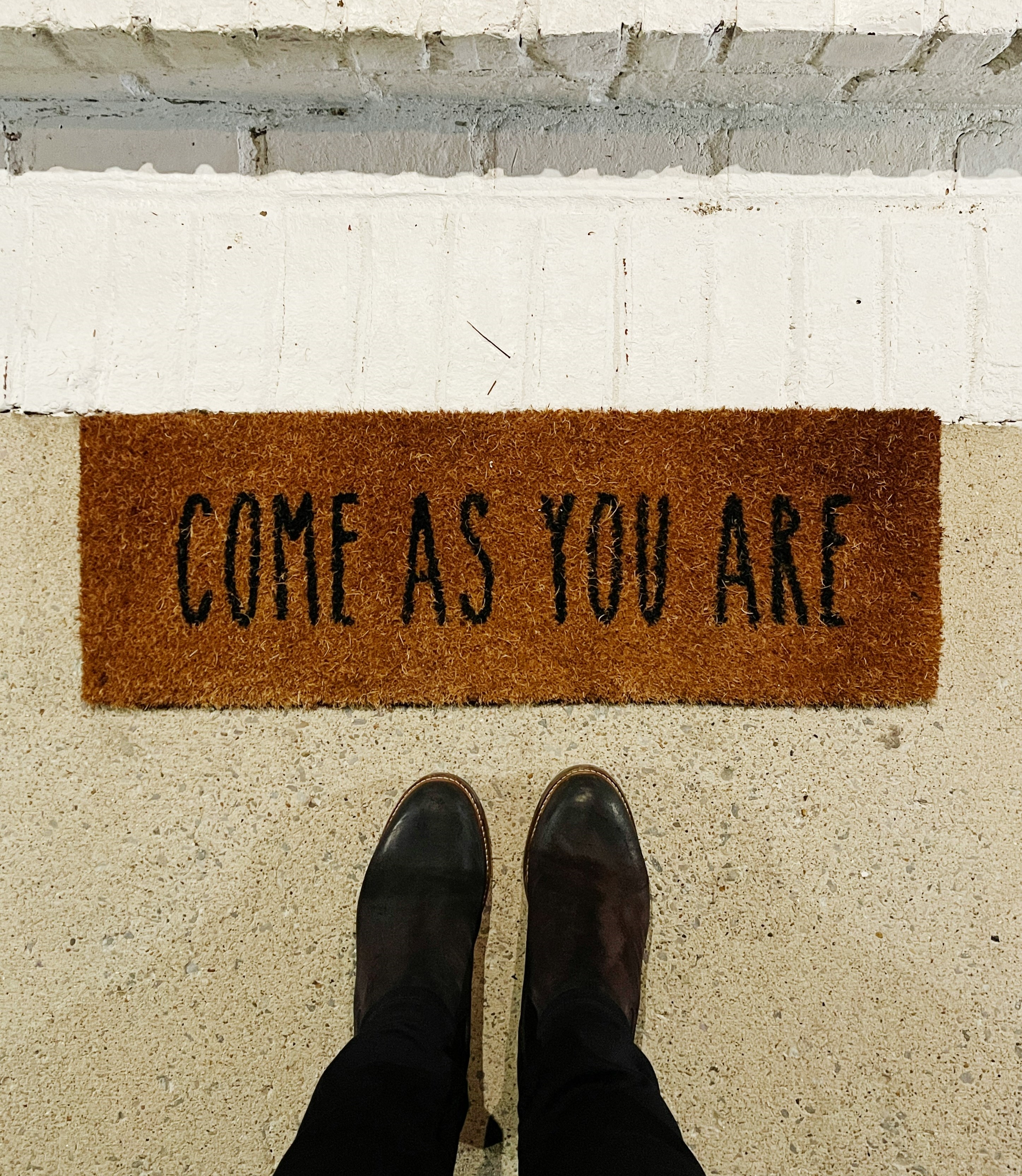
Join us for the first episode in our mini-series on homelessness and belonging. In this episode, Avery is joined by guest hosts Marcus Sibley and Jessica Braimoh to discuss social belonging and homelessness in mid-sized Canadian cities. We talk about their research and we bring you an interview with Western researcher Dr. Carrie Anne Marshall and Kate's Rest founder Brian Hart.
Read the transcript
Episode Notes
Executive Producers for this episode are:
Dr. Jessica Braimoh is a critical sociologist and an assistant professor in the Social Science Department (Criminology) at York University. Her research is focused on the ways social institutions and systems respond to experiences of marginality. She studies the link between criminalization, racialization and class among other systems of domination. She is interested in the ways social institutions are coordinated in their response to marginality.
Dr. Marcus Sibley is an assistant professor in the Department of Criminology at Saint Mary’s University in Halifax. His research critically examines intersecting forms of policing and surveillance in the context of homelessness, sex work and human trafficking, and gender-based violence.
Guests for this episode include:
Dr. Carrie Anne Marshall is an assistant professor at Western University in the School of Occupational Therapy. Her research focuses on the intersection between poverty and mental wellbeing. The majority of her research focuses on homelessness and the transition between unhoused to housed.
Brian Hart is a retired parish priest. In 2006, he bought a property on Big Island in Prince Edward County that is now known as Kate's Rest. He's been living on the property with his friends for 17 years. Kate's Rest is owned and operated by the Kate's Rest Foundation and those who call the property home, which also hosts a 50,000 square foot aquaponics farm. Kate's Rest provides permanent housing and support for people who were homeless or at risk of homelessness.
This episode was produced by Avery Moore Kloss from Folktale Studio.
It was funded by the Social Sciences and Humanities Research Council of Canada.
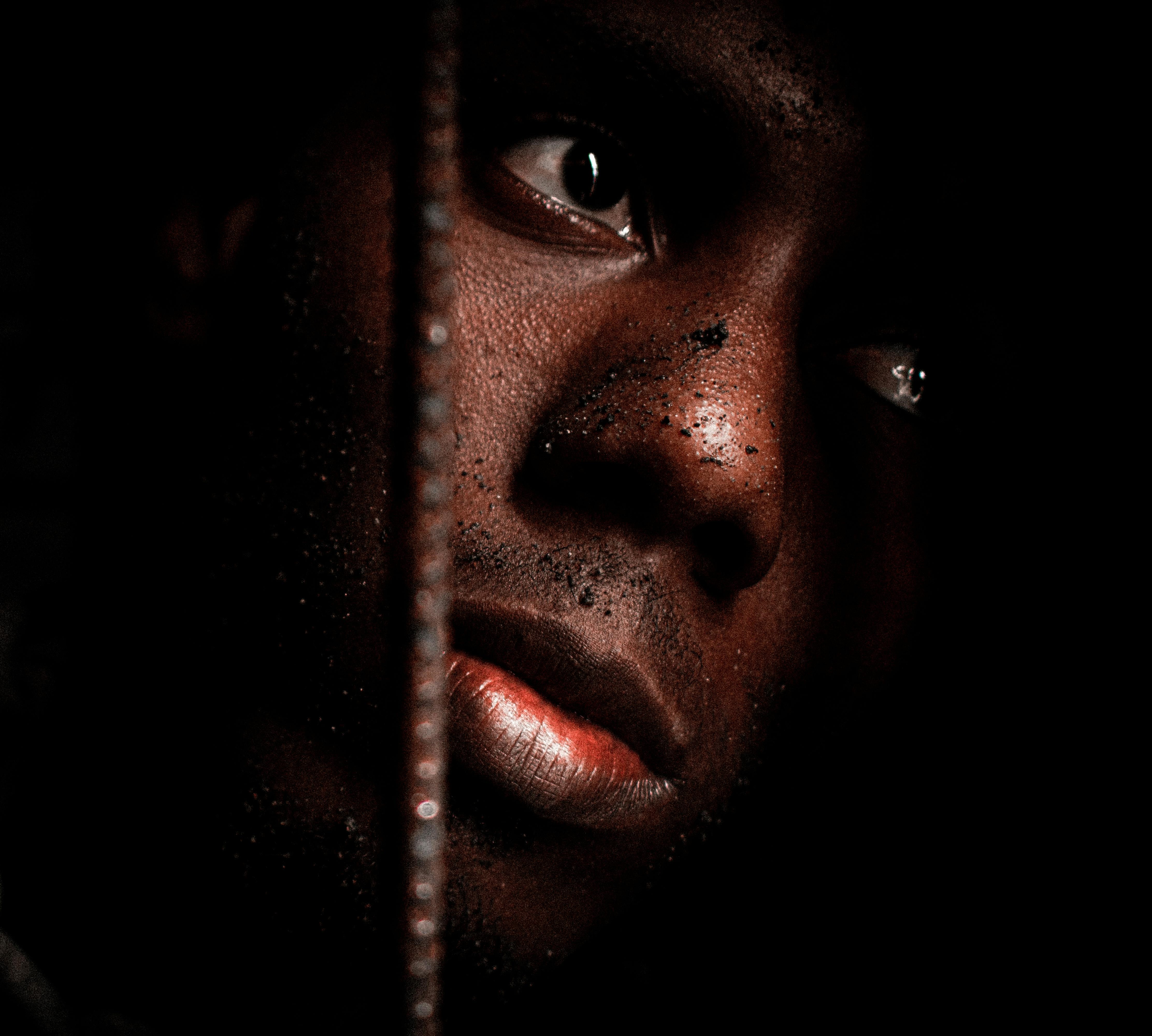
In this episode, we welcome Dr. Robert Ame to talk about his work on Black overrepresentation in the Canadian Youth Justice System and why he thinks ethnic associations play a critical role in the search for a solution. Dr. Ame's work focuses mainly on children's rights, crimes against humanity, youth justice and transitional justice - including the youth justice system in Canada and Ghana.
Read the transcript
Episode Notes
Executive Producers for this episode are:
Dr. Robert Ame is an Associate Professor of Human Rights and criminology at Wilfrid Laurier University. He teaches children's rights, crimes against humanity, youth justice and transitional justice. He is a criminologist and human rights scholar. He holds an MA and PhD from the School of Criminology at Simon Fraser University in British Columbia, Canada, and a BA in criminology and MPhil in sociology from the University of Oslo, Norway. He also earned a BA (Hons.) in Sociology with Psychology from the University of Ghana, Legon-Accra.
--
This episode was produced by Avery Moore Kloss from Folktale Studio.
It was funded by the Social Sciences and Humanities Research Council of Canada.
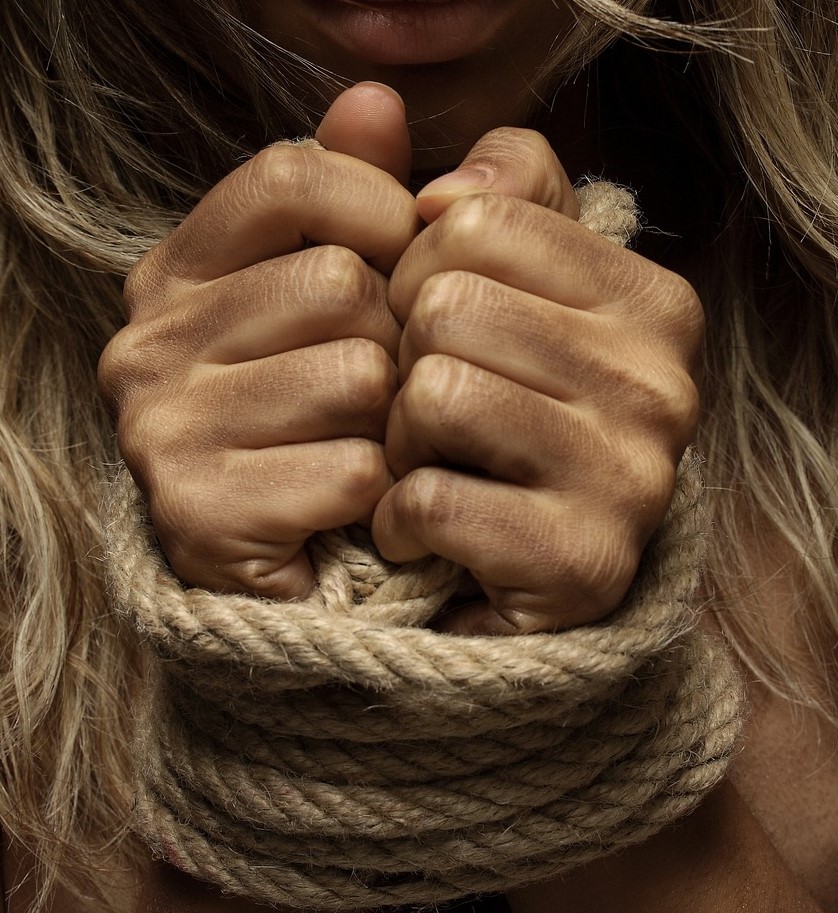
In this episode, we look at critical perspectives on human trafficking in Canada - something that is often misunderstood and heavily policed in this country. Included are the perspectives of academics doing research on human trafficking, an advocacy group representing indoor sex workers and a criminal defence lawyer who works primarily with migrant workers in Canada.
Read the transcript
Episode Notes
Executive Producers for this episode are:
Dr. Katrin Roots is an assistant professor in the Department of Criminology at Wilfrid Laurier University. She has been researching human trafficking in Canada for over 10 years. Her research examines the ways in which international human trafficking laws are translated into Canada's legal context and are subsequently interpreted and enforced within the criminal legal system.
Guests for this episode include:
Dr. Kamala Kempadoo is a professor in the Department of Social Science at York University in Toronto, with graduate appointments in gender, feminist and women's studies, political science, social and political thought and development studies.
Alison Clancey is the Program Director at SWAN Vancouver, which promotes the rights, health and safety of newcomer migrant and immigrant women engaged in indoor sex work through frontline service and systemic advocacy. She also works in the area of trafficking policy.
Shane Martinez is a criminal defence lawyer in Toronto and is an adjunct professor of prison law at York University. His work is involved with justice for migrant workers.
--
This episode was produced by Avery Moore Kloss from Folktale Studio.
It was funded by the Social Sciences and Humanities Research Council of Canada.

In this episode, we talk about the challenges facing equity and inclusion initiatives when it comes to attracting and retaining women police officers at all ranks. Our four guests are international experts in the field of diversity in policing and offer their thoughts on the masculinized culture of leadership, the success of direct entry and fast track initiatives, and where they think more research is needed.
Episode Notes
Executive Producers for this episode are:
Dr. Debra Langan - Associate Professor, Department of Criminology, Wilfrid Laurier UniversityDr. Carrie Sanders - Director, Centre for Research on Security Practices (CRSP) and Professor, Criminology, Wilfrid Laurier University
Guests for this episode include:
Dr. Marisa Silvestri is a reader in Criminology at the University of Kent. Her research interests lie at the intersection of gender, crime, justice, policing and organizational cultures. She is currently working on two books: Police Leadership: Changing Landscapes and Police Leadership: Critical Perspectives.
Dr. Tim Prenzler is a professor of Criminology in the School of Law and Society at the University of The Sunshine Coast in Australia. His research interests include crime and corruption prevention, police and security officer safety, security industry regulation and gender equity in policing.
Dr. Jenny Fleming is a professor of Criminology at the University of Southampton and is the Co-Director of the Institute of Criminal Justice Research at the University of Southampton. She is the Editor-In-Chief of Policing and Society, an international journal of research and policy. Jenny has worked on an informal and formal basis with police agencies and police associations in Australia, the United Kingdom, Scotland, Canada, The Netherlands, the United States and New Zealand.
Dr. Jennifer Brown is a visiting professor in the Manheim Centre at the London School of Economics. She is also a chartered forensic and chartered occupational psychologist. Her research interest is in police occupational culture especially with reference to stress experienced by officers and diversity -- particularly women's roles and coping strategies.
--
This episode was produced by Avery Moore Kloss from Folktale Studio.
It was funded by the Social Sciences and Humanities Research Council of Canada.

On this episode of CRSP Talk, CRSP researcher Jennifer Lavoie takes us through her own and other Canadian research on police responses to people in mental health crisis. Joining this conversation are professionals from mental health agencies, a police officer who works in training and a person with lived experience of police interactions while in mental health crisis.
Episode Notes
About our guests in this episode:
At the time of this recording Mr. Greg Hodge was a Peer Support Specialist with the Canadian Mental Health Association, and has since accepted a position as a Peer Support Specialist in the Forensics Program at Ontario Shores Centre for Mental Health Sciences. We thank Greg for sharing his lived experience with us for this episode.
Dr. Krystle Martin is a clinical and forensic psychologist. At the time of this recording, she worked as a research scientist at Ontario Shores Centre for Mental Health Sciences. She conducts research at the intersection between mental health and the legal system. Krystle currently has her own clinical practice and continues to consult with local police services on issues related to mental health.
Sgt. Paul Wilson is a police training instructor with the York Regional Police, assigned to the Training and Education Bureau in the Practical Skills Unit.
Contributors to this episode's production:
Avery Moore Kloss - Reporter, Host and Producer
Website
Instagram
Email her at avery@folktalestudio.ca
Jennifer Lavoie - Executive Producer
Carrie B. Sanders - Executive Producer
Support and Funding:
Related research:
Huey, L., Ferguson, L., & Vaughan, A.D. (2021). The Limits of Our Knowledge: Tracking the Size and Scope of Police Involvement with Persons with Mental Illness. Royal Society of Canada. https://rsc-src.ca/sites/default/files/MH%26P%20PB_EN_0.pdf
LaVoie, J.A.A., Alvarez, N., & Kandil, Y. (2022). Developing community co-designed scenario-based training for police mental health crisis response: A relationship policing approach to de-escalation. Journal of Police and Criminal Psychology. https://doi.org/10.1007/s11896-022-09500-2
Livingston, J.D. (2016). Contact between police and people with mental disorders: A review of rates. Psychiatric Services, 67(8), 850-857. https://doi.org/10.1176/appi.ps.201500312
McNeilly, G. (2017). Police interactions with people in crisis and use of force. Office of the Independent Police Review Director Systemic Review Interim Report. https://www.oiprd.on.ca/wp-content/uploads/Police-Interactions-with-People-in-Crisis-and-Use-of-Force-Systemic-Review-Report-March-2017-Small.pdf
Mental Health Commission of Canada - https://mentalhealthcommission.ca

On this episode of CRSP Talk, we welcome Centre for Research on Security Practices researchers Bree Akesson and Andrew Basso to talk about their new book Bureaucracy to Bullets: Extreme Domicide and the Right to Home. We discuss Bree and Andrew's work in warn-torn countries around the world, including their thoughts on how domicide can be applied to the Russian assault on Ukraine.
Episode Contributors
Host and Producer: Avery Moore Kloss, Folktale Studio
Website | Instagram | Email her at hello@averymoorekloss.com
Guests:
Dr. Bree Akesson, Canada Research Chair (Tier II) in Global Adversity and Wellbeing; Associate Professor, Faculty of Social Work and Social Justice & Community Engagement (SJCE) Graduate Program; Associate Director, Centre for Research on Security Practices (CRSP)
Dr. Andrew Basso, Researcher affiliated with the Laurier Institute for the Study of Public Opinion and Policy (LISPOP)
With help from: Dr. Samantha Henderson
Episode Notes
From bureaucracy to bullets: Extreme domicide and the right to home by Bree Akesson and Andrew Basso
https://www.rutgersuniversitypress.org/from-bureaucracy-to-bullets/9781978802711
Book website
Destruction of homes a war crime by Bree Akesson and Andrew Basso
https://www.thestar.com/opinion/contributors/2022/03/07/destruction-of-homes-a-war-crime.html
The right to home: Domicide as a violation of child and family rights in the context of political violence by Bree Akesson, Andrew Basso, Myriam Denov
https://onlinelibrary.wiley.com/doi/abs/10.1111/chso.12174
“We may go, but this is not my home”: Experiences of domicide and resistance for Palestinian children and families by Bree Akesson
https://journalofinternaldisplacement.org/index.php/JID/article/download/50/46
Cumulative domicide: The Sayisi Dene and destruction of home in mid-twentieth century Canada by Andrew Basso, Patrick Ciaschi, Bree Akesson
https://journals.sagepub.com/doi/abs/10.1177/0011392120927763
Castle and cage: Meanings of home for Palestinian children and families by Bree Akesson
https://link.springer.com/article/10.1007/s40609-014-0004-y
Out of place research website
Support and Funding for this episode:


In this episode, we explore the idea of gaining research access to institutions like police agencies or corrections facilities. Securing access can be a complicated process with many barriers to entry, sometimes insurmountable for criminologists who want to conduct research on criminal justice or security institutions. Despite challenges, a large body of empirical criminological research has been published here in Canada and around the world. We speak to four researchers involved in some of those publications.
Episode Contributors
Host and Producer: Avery Moore Kloss, Folktale Studio
Website | Instagram | Email her at hello@averymoorekloss.com
Episode Guests:
Dr. Sandra Bucerius, Professor, Sociology, University of Alberta
Dr. Dale Spencer, Associate Professor, Law and Legal Studies, Carleton University
Dr. Akwasi Owusu-Bempah, Assistant Professor, Sociology, University of Toronto
Dr. Beatrice Jauregui, Associate Professor, Criminology & Sociolegal Studies, University of Toronto
Executive Producers: Dr. Carrie Sanders (Director, Centre for Research on Security Practices and Professor, Criminology, Wilfrid Laurier University) and Dr. Kevin Haggerty (Professor, Department of Sociology, University of Alberta, Canada)
With help from: Dr. Samantha Henderson
Support and Funding for this episode:

In this episode, Avery leads a panel discussion on conceptualizing trauma and suffering -- and how research methods can be used to walk the tightrope of both acknowledging the reality of research participants' suffering, while also uncovering their everyday experiences and humanity. Panelists include Bree Akesson, Martha Bragin and Cindy Sousa.
Support and Funding for this episode:
Social Sciences and Humanities Research Council of Canada (SSHRC)
On this episode, we bring you a case study on how people living in rural places perceive their personal safety and well-being. From what "community safety" means to how they (or how they don't) interact with the police in rural places. During this research project six rural community members from the County of Brant, Ontario were interviewed anonymously about their feelings of safety and well-being. Wilfrid Laurier's Dr. James Popham joins host Avery Moore Kloss to unpack what our rural participants say matters to them when it comes to safety outside of the big city.
Episode Contributors
About our guests in this episode:
Our research participants participated in these recorded interviews anonymously, and therefore are not named in the podcast. We thank them for their thoughts and involvement in this project.
Contributors to this episode's production:
Host and Producer: Avery Moore Kloss, Folktale Studio
Website | Instagram | Email her at hello@averymoorekloss.com
Host: Dr. James Popham, Wilfrid Laurier University
Executive Producers: Dr. Carrie Sanders
With help from: Jocelyn Booton and Dr. Samantha Henderson
Support and Funding for this episode:
Brant Community Foundation
Links to Research mentioned in this episode:
Sampson, R. J., Raudenbush, S. W., & Earls, F. (1998). Neighborhood collective efficacy -- Does it help reduce violence?. NIJ Research Preview, NCJ 184377. Washington, DC: U.S. Department of Justice, National Institute of Justice, Office of Justice Programs. https://nij.ojp.gov/library/publications/neighborhood-collective-efficacy-does-it-help-reduce-violence
Cebulak, C. (2004). Why rural crime and justice really matter. Journal of Police and Criminal Psychology, 19, 71-81. https://doi.org/10.1007/BF02802576
Giblin, M. J., Burruss, G.W., Corsaro, N., & Schafer, J.A. (2012). Self-protection in rural America: A risk interpretation model of household protective measures. Criminal Justice Policy Review, 23(4), 493-517. https://doi.org/10.1177/0887403411421215

In this episode, we invite a panel of international researchers to discuss the importance of place in research. Led by Professor Susan Kemp from the University of Auckland in New Zealand, the panel discusses the importance of place in human security and the theoretical lens they bring to their research work.
Episode Contributors
Avery Moore Kloss - Reporter, Host, & Producer
Bree Akesson - Executive Producer and Panel Guest
Guests
Bree Akesson, is an Associate Professor and Canada Research Chair in Global Adversity and Wellbeing at Wilfrid Laurier University in Canada. She is the Associate Director of the Center for Research on Security Practices. Her research focuses on families who face extreme adversity, such as poverty, war and climate change.
Allen Ratliff is an Assistant Professor in the Department of Family Science and Social Work at Miami University in Ohio. He studies violence against marginalized young people, specifically violence against transgender and non-binary young people and young people experiencing homelessness.
Genevieve Graaf is an Assistant Professor in the School of Social Work at the University of Texas at Arlington. She studies children's health and behavioural health policy and services.
Cindy Sousa is an Associate Professor at the Graduate School of Social Work and Social Research at Bryn Mawr College, outside of Philadelphia. She is the co-director of the Center for Child and Family Well-Being. Her work focuses on the health implications of violence, particularly related to families; the protective effects of culture, place, and social support; and professional responsibility in the face of collective suffering.
Susan Kemp is a Charles O. Cressey Endowed Professor Emeritus at the University of Washington School of Social Work, Seattle and Professor of Social Work at the University of Auckland, New Zealand.
Support and Funding
Social Sciences and Humanities Research Council of Canada (SSHRC)
Wilfrid Laurier University

A brand new report on a groundbreaking survey completed by the Women's National Housing and Homelessness Network sheds new light on housing and homelessness in Canada as a gendered experience for women and gender diverse people. Network Co-Chair Kaitlin Schwan joins Avery to dive deep into the research and break down the 10 Key Findings that have changed the conversation on women's homelessness in Canada. A link to the "The Pan-Canadian Women's Homelessness and Housing Survey" is available in the show notes, or at the Women's National Housing & Homelessness Network.
Episode Contributors
Avery Moore Kloss - Reporter, Host, & Producer
Kaitlin Schwan - Executive Producer and Guest
Erin Dej - Executive Producer
Carrie Sanders - Executive Producer
Kaitlin Schwan is co-chair of the Women’s National Housing and Homelessness Network, and Director of Research for The Shift. Kaitlin teaches social policy at the University of Toronto’s Faculty of Social Work, where she is appointed Assistant Professor, status only. She is also a Senior Researcher at the Canadian Observatory on Homelessness (York University).
Hannah Brais is a member of the Women’s National Housing and Homelessness Network, and is the co-chair of the Policy and Government Relations Working Group. Hannah is the Research Coordinator at the Old Brewery Mission, a large homeless service provider in Quebec.
Khulud Baig is the Housing Researcher and Policy Advisor for the Women’s National Housing and Homelessness Network. She is the author on a national literature review on women and gender diverse people’s housing needs in Canada.
Alex Nelson is a PhD candidate at Western University in Anthropology. They sit on the steering committee of the the Women’s National Housing and Homelessness Network, and the steering committee of the Canadian Lived Experience Leadership Network.
Episode Notes
Read the full report "The Pan-Canadian Women's Homelessness and Housing Survey" in English.
For more about the Women's National Housing and Homelessness Network visit: https://womenshomelessness.ca/
Support and Funding


Alongside scholars and concerned journalists, a vibrant artistic movement is emerging to interrogate and intervene in security and surveillance operations. Critical surveillance art can be visually appealing, intensely participatory, and sometimes deeply troubling. In this episode, we feature the work of Heather Dewey-Hagborg and Dries Depoorter, two artists who take different approaches to critical surveillance art.
Episode Contributors
Avery Moore Kloss - Reporter, Host, & Producer
Torin Monahan - Executive Producer and Guest
With the help of Carrie Sanders
Torin Monahan is a professor of Communication at the University of North Carolina at Chapel Hill. His research focuses on institutional and cultural transformations enabled by new technologies, with a particular emphasis on surveillance and security programs. He is currently working on a project on critical surveillance art. Find more information about Torin's work here.
Heather Dewey-Hagborg is an artist and biohacker. She uses art to bring public attention to emerging issues in biotechnology. Heather has a PhD in Electronic Arts from Rensselaer Polytechnic Institute. She is a visiting assistant professor of interactive media at NYU Abu Dhabi. See more of Heather's work, including Stranger Visions and T35II, A post-genomic love story, on her website.
Dries Depoorter is a Belgian artist who addresses themes of privacy, artificial intelligence, surveillance and social media through the creation of interactive installations, apps and games. See more of Dries' work, including Jaywalking here.
Support and Funding
Social Sciences and Humanities Research Council of Canada (SSHRC)
Wilfrid Laurier University

On this episode, we’re talking about visualizing security studies and how scholars are working with different aesthetic approaches to research. Our panel of guests includes Sara Matthews, Nayrouz Abu Hatoum and Brett Story. Though their projects are quite distinct, what our guests have in common is their turn to visual representation as a way of thinking about security.
Episode Contributors
Avery Moore Kloss - Reporter, Host, & Producer
Sara Matthews - Executive Producer and Panel Guest
Ana Visan - Planning and Research Support
Guests
Brett Story is an assistant professor of Image Arts at Ryerson University. She is also a documentary filmmaker and geographer. Her work focuses on issues of state violence and social control. Specifically on the carceral state and geographies of the prison industrial complex.
Click here for a link to Brett's film A Prison in Twelve Landscapes.
Nayrouz Abu Hatoum is an assistant professor in the Department of Sociology and Anthropology at Concordia University. Nayrouz is interested in visual politics, place-making and spatial politics in the context of Israel and Palestine.
Sara Matthews is an associate professor in the Department of Global Studies at Wilfrid Laurier University. Her work explores the relations between visual culture and martial politics.
Click here for a link to Sara's work "The Cultural Life of Drones".
Support and Funding:
Social Sciences and Humanities Research Council of Canada (SSHRC)
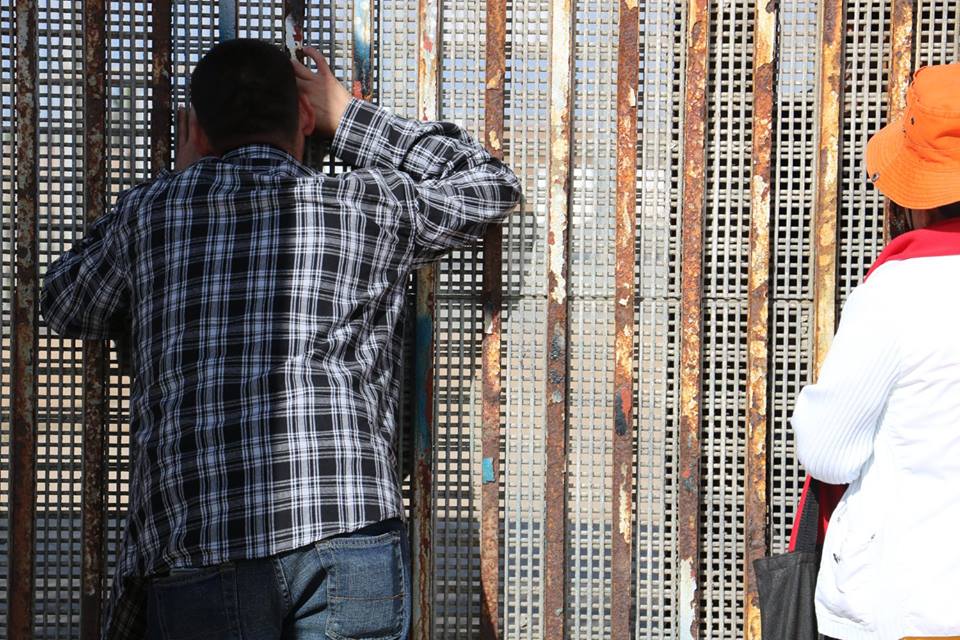
In this episode, we invite a panel of international researchers to discuss their experiences with research ethics while performing field work in international settings. This panel discussion was inspired by ongoing conversations between CRSP members and their colleagues about the challenges of practicing research ethics in the field.
Read the transcript | Important links and studies
Episode Contributors
Avery Moore Kloss - Reporter, Host, & Producer
Bree Akesson - Executive Producer and Panel Guest
Shane M. Dixon - Executive Producer
Guests
Bree Akesson is an Associate Professor of Social Work at Wilfrid Laurier University. She is also the the Canada Research Chair in Global Adversity and Well-being and the Associate Director of CRSP.
Kearney Coupland is a PhD candidate in Geography and Environmental Studies at Wilfrid Laurier University. She is also the chair of the Community Research Ethics office.
Festus Moasun holds a PhD in Social Work from Wilfrid Laurier University and is currently teaching at Laurier, University of Windsor, and King’s College.
Steve Sider is an Associate Professor in the Faculty of Education here at Laurier.
Stacey Wilson-Forsberg is an Associate Professor in the Human Rights and Human Diversity program. She is also the Director of the Tshepo Institute for the Study of Contemporary Africa.
Support and Funding
Social Sciences and Humanities Research Council of Canada (SSHRC)
Wilfrid Laurier University

Episode Contributors
Carrie B. Sanders - Executive Producer
Alana Saulnier - Executive Producer & Guest
Guests
Dr. Alana Saulnier is an Assistant Professor at Lakehead University. She has studied the effects of body-worn cameras in pilot programs with the Chicago Police Department, Durham Regional Police Service, and the Guelph Police Service.
Dr. Bryce Newell is an Assistant Professor of Media Law and Policy in the School of Journalism and Communication at the University of Oregon. his book, "Police Visibility: Privacy, Surveillance, and the False Promise of Body-Worn Cameras" is a socio-legal study of body-worn camera adoption by two police agencies in Washington State. it will be released by the University of California press in June 2021. the link to pre-order his book is included in the show notes.
Dr. Cynthia Lum is the Director of the Centre for Evidence Based Crime Policy at George Mason University and also a professor in their Criminology, Law and Society Department. She is the first author of a Campbell Collaboration Systematic Review on body-worn cameras. we’ve included a link to that review in the show notes as well.
Dr. Michael White is a Professor in the School of Criminology and Criminal Justice at Arizona State University. He’s also the Co-Director of Training and Technical Assistance for the U.S. Department of Justice body-worn camera funding program.
Thank you to our funders

We discuss the advantages of using podcasting as a way of sharing research findings. Because there is a diverse range of podcasting formats, selecting the one most appropriate for communicating your research stories can be difficult. To make choosing the right format a little easier, we explore the characteristics of four popular podcasting styles.
Episode Contributors
Gajan Balan
Shane Dixon - Executive Producer
Thank you to our funders
Faculty of Human and Social Sciences, Wilfrid Laurier University
